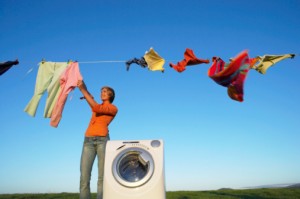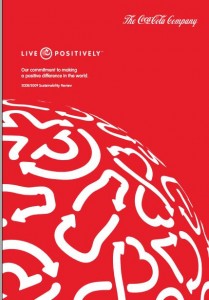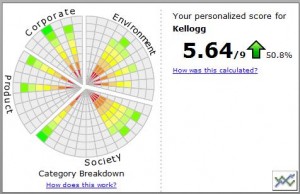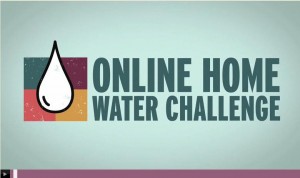I came across this blog post the other day and the first thing that came to my mind was that culture really plays an important role in affecting people’s actions and behaviour. In this post, the author talks about the benefits of using clothes lines to dry your clothes instead of using a dryer. I know that in many Asian countries, such as Hong Kong and Macau, most people do not own a dryer and they usually just line dry their clothes on their balconies. It is recommended for Canada to try out this practice of hanging one’s clothes on a clothing line in one’s backyards or under balconies in the summer and early fall. Consequently, this will reduce the consumption of electricity by the dryers.
9th
Akina talked about the concept of square-bottled cokes and the benefits associated with this innovative packaging design. In addition to the green packaging, Coca-Cola is also actively taking a lot of green movements:
- The company has made the commitment to become greener by switching to diesel-electric hybrid delivery trucks in North America. These hybrid trucks help the company to reduce the environmental impact and save fuel resource
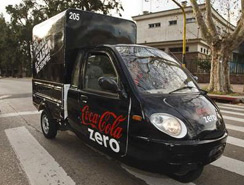
- Coke is going to implement the “turn waste into energy” program that they have been using in Japan since 2004 in North America; hoping that this can significantly reduce the waste that has to be put into landfill and cut pollution
- They have installed a lot of technologies that help to make their buildings more eco-friendly, for example, they use energy efficient lighting and have also developed a plain-level water efficiency toolkit that helps to use water efficiently
If you are interested to know more about Coke’s sustainability programs, please read their 2008/2009 Sustainability Review.
8th
Do you know that London Drugs has been doing a lot of recycling and has already recycled 10 million pounds of waste (i.e. equivalent to 12 full-loaded 747 Jumbo Jets or 42 Blue Whales or 6,215 Smart Cars)?
Today, my Tlog class did a field trip to the London Drugs Distribution Service Centre and the representative told us about their green initiative recycling enhancement introduced in Fall 2009: Staff separate the Distribution Service Centre waste for recycling. This disposal system includes compactors for cardboard, paper, mixed trash and plastic shrink wrap baler.
In addition to recycling their own DSC waste, they also recycle their customers’ waste for free (i.e. it is free if the item was purchased at London Drugs):
- E-Waste Recycling Program – Customers can bring old electronics and appliances such as computers, TVs and printers to any of their stores and they’ll break these appliances down into recyclable parts which can then be used again. For example, they work with Free Geek to stop computer abandonment:

- Packaging Recycling Program – Instead of tossing the packaging and Styrofoam you got from your purchases, bring them back to London Drugs and they’ll take it back for responsible recycling. Customers can also just leave the packaging at the store as they leave with their new purchases!
7th
Natalie shows this interesting advertisement on her blog:

The classroom setting in this ad inspired me to explore the power of peer pressure on promoting sustainability, since we know that people and companies are very likely to change their behaviour when they see their peers change.
Here’s an interesting piece of information I found that demonstrates how peer pressure can lead to big energy savings:
“Using Peer Pressure to Cut Energy Use”
A company called OPOWER has what appears to be a successful strategy for dealing with this human element of energy efficiency.
The company’s approach is based on the idea that people want to fit in. OPOWER first lets people know how their energy use compares to that of their neighbors. Then for each billing period the company gives them a single tip that they can act on, also connected to what their neighbors are doing, such as “Most people in your area keep their AC at 78 degrees.” They also tell people how much energy they will save.
On average the program has cut energy consumption by a modest amount–about 2.5%.
Another company I found recently that is doing some sustainability marketing is Keebler. Keebler has started to work with TerraCycle in an upcycling program; in which they’ll collect cookie wrappers and turn them into eco-friendly products, such as backpacks and pencil cases!
Sixth
I read Mike’s post “PINKWASHING, AND FRIED CHICKED” and realized that green-washing and pink-washing are literally the same thing: misleading customers to make the assumption that purchasing their products or services can lead to a good cause.
As Mike said, consumers need to apply objective thought when purchasing products. But isn’t it a bit difficult for consumers to know which companies are actually green and offer real sustainable products or services?
A solution to this difficulty is provided by green rating systems.
There are numerous green rating systems, such as Goodguide, Treehuger and Corporate Register. But the one that caught my attention was Zumer.
Zumer calls itself the Wikipedia of sustainability: the largest database on corporate sustainability information.
It is a consumer oriented website that provides rankings on consumer brands, products and companies based on individuals’ personal preferences and user contributed research and ratings.
The overall score that a company gets is based on the consumers’ insights on the company’s performance on 45 different indicators in 4 categories: Environment, Society, Product Responsibility and Corporate Citizenship. The thing that I like about Zumer is that consumers (which include students, professors/teachers/researchers, companies, and interested individuals) get their chance to speak out by not only rating; they are also encouraged to post their comments and opinions on the site.
For example, here’s the rating of Kellogg from Zumer:
So maybe you can search your favorite companies on Zumer and see if they are as “green” as you thought.
5th
During class, this video was shown:

And it reminded me of another video that I watched before:

It is interesting to see what actually motivates people: it is not money that economic theorists point to, it is not the benefits you gained; it is fun. So, essentially the easiest way to change people’s behaviour for the better is by just making it fun to do.
Maybe the same concept can be applied to green marketing: Show consumers that it is fun, interesting and easy to do the activities like they normally do but with some green-ness added to it. I’ve recently found this new product, Replenish Cleaners and thought that their ad was a really good example of simple yet effective green marketing:
Some other interesting videos showing how people’s behaviour can be changed just because of… FUN:
Piano Staircase – to encourage people to take the stairs instead of the escalator

The World’s Deepest Bin – to encourage people to throw rubbish in the bin instead of onto the floor

Fourth…
When you think of an eco-friendly car, what brand immediately comes to your mind?
I would say Honda.
Even though Honda is in the car selling business that contributes to a great portion of the world’s pollution and global warming, they are the number one company that I think does best in showing their efforts to “green up” the industry. They have been introducing innovative eco-friendly cars such as hybrid cars and Hydrogen fuel cell car, carrying out effective environmental conservation activities, and aggressively communicating with their customers the need of being environmentally sensitive.
Honda, of course, has a huge marketing budget that they use to make good advertisements. However, Honda always goes beyond the typical sustainable direction by promoting both their products and global issues in a fun and fascinating way:
Honda wins Commercial of the Decade, but not for the ad you think

In addition to their high reputation and product quality, they do care about their customers and often engage and reach out to them in big ways:


For years, Honda’s philosophy has been making the world a better place. And I think they’ve been doing a great job!
Third…
Our motivations are unbelievably interesting!
In order to promote successful green marketing, marketers have to first define what motivates people. Consumers are generally more motivated to doing something that’s easy, and will save them money compared to doing things only with the purpose of greening the planet or conserving water.
I found this interesting video made by RSA (an organization that helps to create social change through storytelling, they create incredible and compelling stories based on free lectures by leading experts) that shows the surprising story behind what motivates comsumers:
Second…
In my sustainability marketing class on Thursday, my professor mentioned that her friend stores and uses rainwater for some of her daily usage. This made me think about how much water and money is going down the drain and realized that managing the amount of water used is a huge factor in sustainability.
So… have you ever wondered how much water you are wasting or how much it is costing you? Please watch this video and you’ll be shocked with the answer!
136 gallons per person per day! This leads us to realize the importance of saving water. And in order to do so, let’s start off with an easy way. I found an interesting and practical Apple app. called Drip Detective which allows users to quickly and easily find out how much that dripping faucet is costing them. This is indeed a great example of simple green marketing: an excellent way for people to realize the impact of what may seem like an insignificant waste of water. In addition to conserving water, it will also help you achieve savings that will really add up.
Please visit 100 Ways To Conserve Water – Use It Wisely to learn more ways of water conservation and get started to save hundreds of gallons of water a month! We all know that there are a number of ways to save water, but they all start with you!
First…
I came across this blog entry the other day and the first thing that came to my mind was the importance of teaching younger generations about sustainability. In order to have a sustainable world, everyone has to do their part, including kids (yes, kids!). Educating children to go green allows them to become responsible members of the planet, and to respect all of the resources that are available. However… because it is already kind of hard for adults to live and act sustainably, it would seem to be even harder for children to do so.
Nonetheless, the author of the blog shares her tips and ideas on how to teach sustainability to kids in a fun way. I was amazed at how simple and interesting it is for adults to teach kids to be kind to the environment. What I found the most interesting was the “Have Fun Shopping Green” section – as we all know, there are more and more products in the market that claim to be eco-friendly, but given that both eco-friendly and normal products are available, are we consumers willing to pay the extra money to purchase the sustainable ones?
Although the suggested activities are all aimed for children, I think they are also applicable to people of all ages since there’s always a need for us to remind ourselves to lead a greener and more earth-friendly life, right?
The author also recommends another website – Ollie’s World, which is very interesting as well. Please check it out when you have time!
